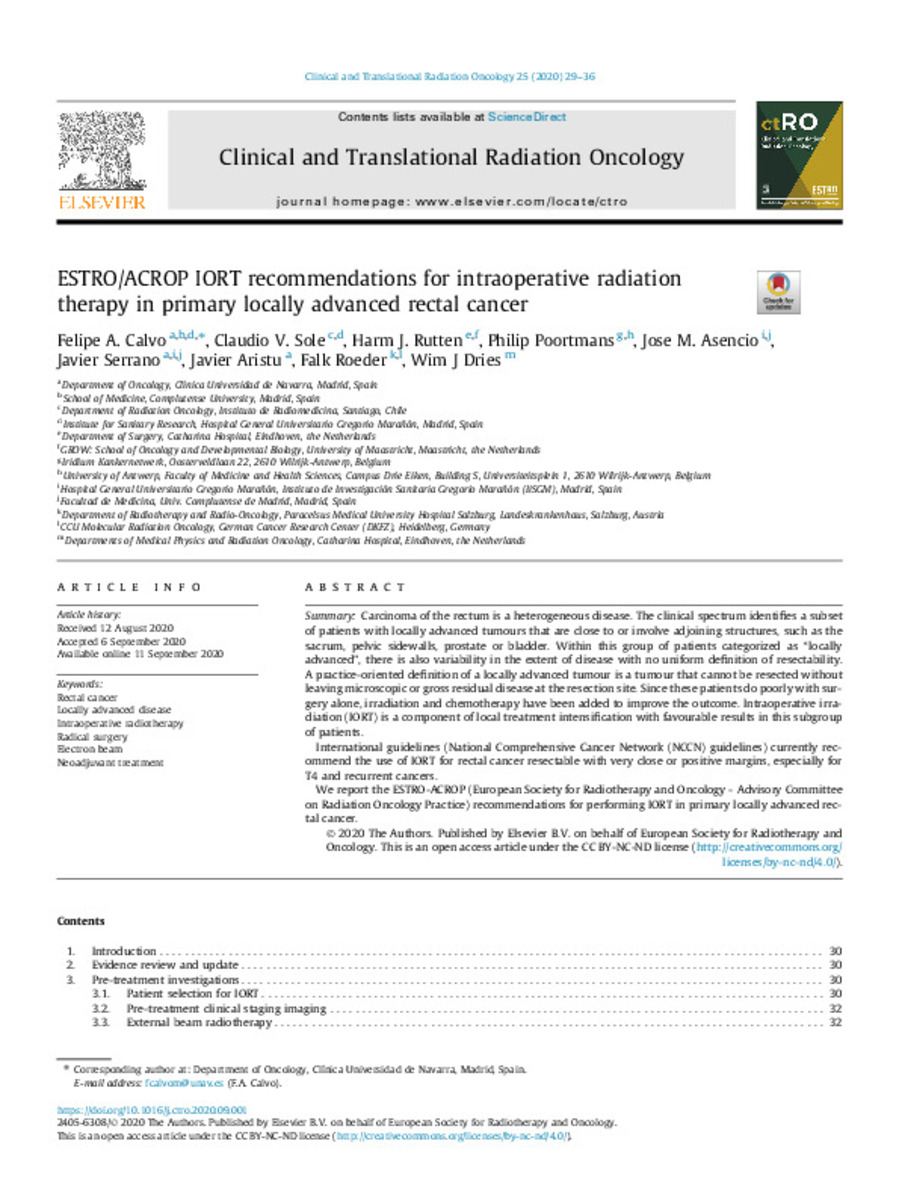Full metadata record
| DC Field | Value | Language |
|---|---|---|
| dc.creator | Calvo, F.A. (Felipe A.) | - |
| dc.creator | Solé, C. (Claudio) | - |
| dc.creator | Rutten, H.J. (Harm J.) | - |
| dc.creator | Poortmans, P. (Philip) | - |
| dc.creator | Asencio, J.M. (José Manuel) | - |
| dc.creator | Serrano-Andreu, J. (Javier) | - |
| dc.creator | Aristu-Mendioroz, J.J. (José Javier) | - |
| dc.creator | Krempien, R. (Robert) | - |
| dc.creator | Dries, W.J. (Wim J.) | - |
| dc.date.accessioned | 2023-05-16T12:10:39Z | - |
| dc.date.available | 2023-05-16T12:10:39Z | - |
| dc.date.issued | 2020 | - |
| dc.identifier.citation | Calvo, F.A. (Felipe A.); Solé, C. (Claudio); Rutten, H.J. (Harm J.); et al. "ESTRO/ACROP IORT recommendations for intraoperative radiation therapy in primary locally advanced rectal cancer". Clinical and Translational Radiation Oncology. 25, 2020, 29 - 36 | es |
| dc.identifier.uri | https://hdl.handle.net/10171/66265 | - |
| dc.description.abstract | Summary: Carcinoma of the rectum is a heterogeneous disease. The clinical spectrum identifies a subset of patients with locally advanced tumours that are close to or involve adjoining structures, such as the sacrum, pelvic sidewalls, prostate or bladder. Within this group of patients categorized as ‘‘locally advanced”, there is also variability in the extent of disease with no uniform definition of resectability. A practice-oriented definition of a locally advanced tumour is a tumour that cannot be resected without leaving microscopic or gross residual disease at the resection site. Since these patients do poorly with surgery alone, irradiation and chemotherapy have been added to improve the outcome. Intraoperative irradiation (IORT) is a component of local treatment intensification with favourable results in this subgroup of patients. International guidelines (National Comprehensive Cancer Network (NCCN) guidelines) currently recommend the use of IORT for rectal cancer resectable with very close or positive margins, especially for T4 and recurrent cancers. We report the ESTRO-ACROP (European Society for Radiotherapy and Oncology - Advisory Committee on Radiation Oncology Practice) recommendations for performing IORT in primary locally advanced rectal cancer. | es_ES |
| dc.description.sponsorship | Javier Serrano Is member of the IOeRT Consortium, established on 21 December 2019, supported by Sordina IORT Technologies spa Felipe A. Calvo: Is member of the IOeRT Consortium, established on 21 December 2019, supported by Sordina IORT Technologies spa Philip Poortmans Is member of the IOeRT Consortium, established on 21 December 2019, supported by Sordina IORT Technologies spa Is medical advisor of Sordina IORT Technologies spa, starting from 1 April 2020 on | es_ES |
| dc.language.iso | eng | es_ES |
| dc.rights | info:eu-repo/semantics/openAccess | es_ES |
| dc.subject | Rectal cancer | es_ES |
| dc.subject | Locally advanced disease | es_ES |
| dc.subject | Intraoperative radiotherapy | es_ES |
| dc.subject | Radical surgery | es_ES |
| dc.subject | Electron beam | es_ES |
| dc.subject | Neoadjuvant treatment | es_ES |
| dc.title | ESTRO/ACROP IORT recommendations for intraoperative radiation therapy in primary locally advanced rectal cancer | es_ES |
| dc.type | info:eu-repo/semantics/article | es_ES |
| dc.description.note | This is an open access article under the CC BY-NC-ND license (http://creativecommons.org/licenses/by-nc-nd/4.0/). | es_ES |
| dc.identifier.doi | 10.1016/j.ctro.2020.09.001 | - |
| dadun.citation.endingPage | 36 | es_ES |
| dadun.citation.publicationName | Clinical and Translational Radiation Oncology | es_ES |
| dadun.citation.startingPage | 29 | es_ES |
| dadun.citation.volume | 25 | es_ES |
Files in This Item:
Statistics and impact
Items in Dadun are protected by copyright, with all rights reserved, unless otherwise indicated.






